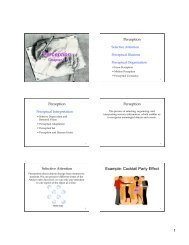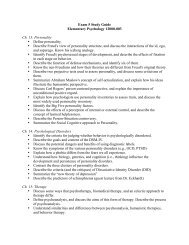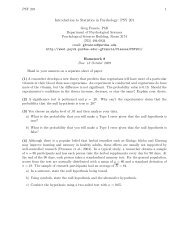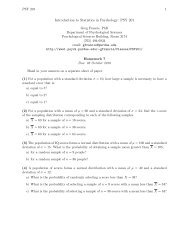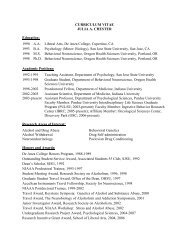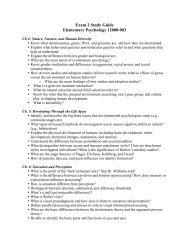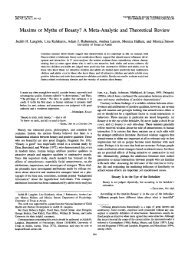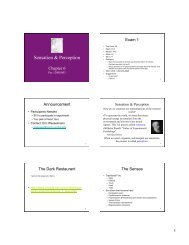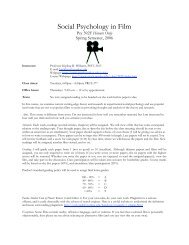Introduction to Cognitive Psychology - Department of Psychological ...
Introduction to Cognitive Psychology - Department of Psychological ...
Introduction to Cognitive Psychology - Department of Psychological ...
Create successful ePaper yourself
Turn your PDF publications into a flip-book with our unique Google optimized e-Paper software.
Greg Francis 1/7/11Decision makingPSY 200Greg FrancisLecture 33What every consumer should knowbefore buying.Purdue UniversityDecision making!! We have <strong>to</strong> make lots <strong>of</strong> choices!!course selections!!elections!!housing!!job!!cancer treatment!! What affects our choices?!! How do we make choices?Purdue UniversityTopics!! Influences on decision making!!framing effects!!risks!!alternatives!!loss aversion!! Effects are <strong>of</strong>ten relatedFraming effects!! Your decisions are influenced by the way aset <strong>of</strong> choices is presented!! The child cus<strong>to</strong>dy problem!!two versions, essentially the same!!lead <strong>to</strong> different choicesPurdue UniversityPurdue UniversityVersion 1: award frame!! Imagine that you serve on the jury <strong>of</strong> an only-child solecus<strong>to</strong>dycase following a relatively messy divorce. The factsare complicated by ambiguous economic, social, andemotional considerations, and you decide <strong>to</strong> base yourdecision entirely on the following few observations. To whichparent would you award sole cus<strong>to</strong>dy <strong>of</strong> the child?!! Parent A: average income, average health, average workinghours, reasonable rapport with child, relatively stable sociallife!! Parent B: above-average income, very close relationship withchild, extremely active social life, lots <strong>of</strong> work-related travel,minor health problems64%Version 2: deny frame!! Imagine that you serve on the jury <strong>of</strong> an only-child solecus<strong>to</strong>dycase following a relatively messy divorce. The factsare complicated by ambiguous economic, social, andemotional considerations, and you decide <strong>to</strong> base yourdecision entirely on the following few observations. To whichparent would you deny sole cus<strong>to</strong>dy <strong>of</strong> the child?!! Parent A: average income, average health, average workinghours, reasonable rapport with child, relatively stable sociallife!! Parent B: above-average income, very close relationship withchild, extremely active social life, lots <strong>of</strong> work-related travel,minor health problems55%Purdue UniversityPurdue UniversityPSY200 <strong>Cognitive</strong> <strong>Psychology</strong> 1





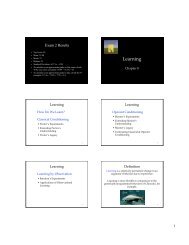
![Exam 4 Study Guide[1]](https://img.yumpu.com/45196739/1/190x245/exam-4-study-guide1.jpg?quality=85)
